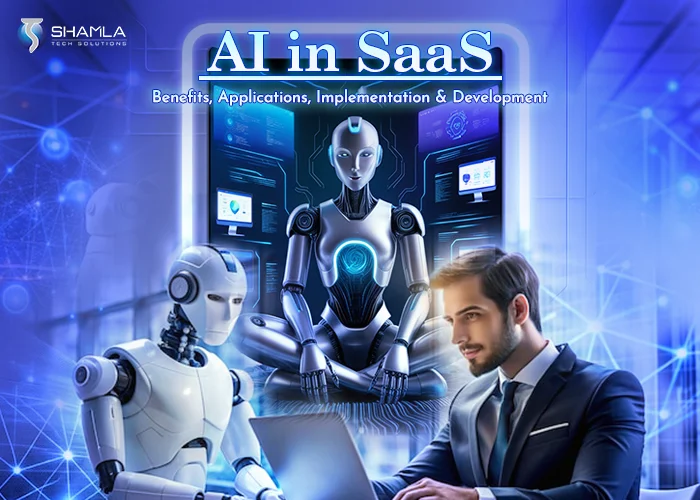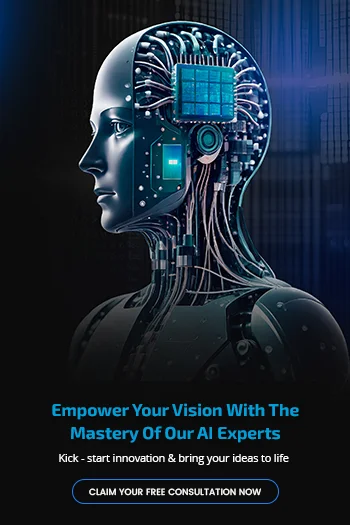Artificial intelligence (AI) is revolutionizing the SaaS industry by introducing
advanced capabilities and efficiencies. AI-powered SaaS platforms are transforming
business operations through enhanced automation and intelligent data analysis. These
AI SaaS solutions leverage machine learning to provide predictive analytics,
streamline customer support, and optimize workflows. The AI integration in SaaS
enables companies to develop robust applications that are more responsive and
adaptive to user needs. With the rise of AI-driven SaaS applications, businesses are
increasingly adopting AI SaaS tools for improved performance and competitive
advantage, including specialized applications like predictive analytics SaaS and AI
SaaS for customer support.
What is AI-Powered SaaS?
AI-powered SaaS refers to software as a service platform that leverages artificial
intelligence to enhance functionality, efficiency, and user experience. These platforms
integrate AI technologies to provide intelligent automation, predictive analytics, and
personalized solutions.
Key Components and Technologies Involved in AI-Powered SaaS
Machine Learning SaaS: This technology employs sophisticated algorithms to analyze
vast amounts of data, identify patterns, and make data-driven decisions. By
automating these processes, businesses can derive actionable insights, improve
forecasting, and optimize operations without manual intervention.
AI Integration in SaaS: Integrating AI tools and frameworks into SaaS platforms
enhances their capabilities significantly. This includes incorporating machine learning
models, natural language processing (NLP), and other AI technologies to automate
tasks, personalize user experiences, and improve decision-making processes.
AI-Driven SaaS Applications: These applications leverage AI to provide specialized solutions, such as predictive analytics SaaS and AI SaaS for customer support. Predictive analytics helps businesses anticipate trends and make proactive decisions, while AI-powered customer support systems can handle inquiries efficiently, offering personalized and accurate responses.
SaaS AI Platforms: These platforms provide the necessary infrastructure and tools to develop and deploy AI-powered applications. They offer a robust environment where developers can build, test, and launch AI-driven features, ensuring scalability and integration with existing systems.
Transforming Traditional Software: AI-powered SaaS transforms traditional software by embedding intelligent features that enable businesses to achieve greater efficiency and insights. This transformation involves automating repetitive tasks, enhancing data analysis, and providing predictive capabilities, which collectively drive better business outcomes.
The key components and technologies involved in AI-powered SaaS solutions provide a comprehensive framework for enhancing business operations, from data analysis and decision-making to customer support and operational efficiency. Integrating these advanced technologies into SaaS platforms empowers businesses to stay competitive and innovative in a rapidly evolving digital landscape.
Benefits of AI SaaS Solutions
AI-powered SaaS solutions offer a multitude of benefits that can significantly enhance business operations and outcomes.</span
Enhanced Efficiency and Productivity: AI SaaS solutions automate routine tasks, freeing up valuable time for employees to focus on more strategic activities. AI integration in SaaS platforms streamlines processes such as data entry, analysis, and reporting, leading to improved operational efficiency and productivity.
Cost Savings: By automating repetitive tasks and optimizing resource allocation, AI SaaS tools reduce the need for manual intervention, thereby cutting labor costs. Additionally, the predictive capabilities of machine learning SaaS can identify potential issues before they escalate, saving costs related to downtime and maintenance.
Improved Customer Experience: AI-driven SaaS applications such as AI SaaS for customer support offer personalized and responsive customer service. These applications can quickly analyze customer queries and provide accurate responses, leading to higher satisfaction and loyalty. AI-powered chatbots and virtual assistants enhance the overall customer experience by providing instant support.
Data-Driven Decision Making: SaaS AI platforms leverage advanced analytics and predictive analytics SaaS to provide actionable insights. Businesses can use these insights to make informed decisions, optimize strategies, and anticipate market trends. The ability to analyze large volumes of data in real-time enables companies to stay agile and competitive.
AI-powered SaaS solutions transform traditional software by embedding intelligent features that enhance efficiency, reduce costs, improve customer experiences, and facilitate data-driven decision-making. This integration of AI into SaaS platforms is revolutionizing the way businesses operate and compete in the digital age.
AI-Driven SaaS Applications
AI-powered SaaS solutions are revolutionizing various business processes through advanced AI-driven applications. Here are key examples:
Predictive Analytics SaaS: Leveraging machine learning SaaS capabilities, predictive analytics tools analyze historical data to forecast future trends. This enables businesses to make proactive decisions, optimize operations, and anticipate market changes, enhancing overall strategic planning.
AI SaaS for Customer Support: AI integration in customer support platforms automates responses to common queries, improving response times and accuracy. AI-driven chatbots and virtual assistants provide personalized interactions, enhancing customer satisfaction and reducing the workload on human support teams.
Personalized Marketing and Sales Automation: AI SaaS tools in marketing and sales use data-driven insights to tailor campaigns and automate outreach. These tools analyze customer behavior and preferences, enabling businesses to deliver targeted content, improving engagement and conversion rates.
Fraud Detection and Security: SaaS AI platforms equipped with AI capabilities can detect unusual patterns and anomalies in real-time, helping businesses prevent fraud and enhance security. These systems continuously monitor transactions and access points, providing a robust defense against cyber threats.
AI-powered SaaS applications in predictive analytics, customer support, marketing, sales, and security offer significant advantages by automating processes, providing deep insights, and enhancing operational efficiency. Integrating these AI SaaS solutions enables businesses to stay competitive and responsive in a dynamic market.
AI Integration in SaaS Platforms
AI-powered SaaS platforms are transforming the way businesses operate by enhancing efficiency, automating processes, and providing deeper insights. However, integrating AI into existing SaaS platforms involves several critical considerations, steps, and solutions to common challenges.
Key Considerations for Integration
- Data Quality: High-quality data is crucial for accurate AI analysis. Ensure that the data is clean, well-organized, and free from errors.
- Scalability: The AI systems must be designed to scale with growing data volumes and user bases. This ensures that the platform remains efficient and responsive as demand increases.
- Security: Protecting sensitive data is paramount. Implement robust security protocols, including encryption and secure access controls, to safeguard user information.
Steps to Integrate AI into Existing SaaS Platforms
- Assessment: Begin by evaluating the current SaaS platform’s readiness for AI integration. Identify the areas where AI can add the most value.
- Define Objectives: Clearly outline the goals for the AI integration, whether it’s enhancing predictive analytics, improving customer support, or automating routine tasks.
- Data Preparation: Clean and organize the existing data. This step is critical for the success of any AI initiative, as the quality of the data directly impacts the performance of AI models.
- Select AI Tools: Choose the appropriate AI SaaS tools and frameworks that align with your objectives. This could include machine learning libraries, natural language processing tools, or other AI technologies.
- Integration: Embed the selected AI tools into the SaaS platform. Ensure that the AI components seamlessly interact with the existing features and workflows.
- Testing: Conduct thorough testing to ensure that the AI-enhanced features work as expected. This includes validating the accuracy of AI predictions and ensuring that the integration does not disrupt existing functionalities.
- Deployment: Once testing is complete, deploy the AI-enhanced features to the live environment. Monitor the deployment closely to address any issues that arise.
Challenges and Solutions
- Data Privacy: Protecting user data is a significant concern. Use encryption and data anonymization techniques to ensure that sensitive information is secure.
- Complexity: AI models can be complex and difficult to manage. Simplify the models where possible and ensure that the development team fully understands the AI processes.
- Maintenance: AI systems require regular updates and maintenance to remain effective. Establish a maintenance schedule to update AI models with new data and refine algorithms as needed.
Integrating AI into SaaS platforms, whether for predictive analytics SaaS or AI SaaS for customer support, can significantly enhance business capabilities and operational efficiency. By carefully considering data quality, scalability, and security, and by following a structured integration process, businesses can successfully develop and launch AI-driven SaaS applications. Addressing the challenges with robust solutions ensures that the AI integration provides lasting value and competitive advantage.
Development of AI SaaS Tools
Building AI Capabilities from Scratch vs. Using Third-Party ToolsWhen developing AI-powered SaaS solutions, businesses face the choice between building AI capabilities from scratch or leveraging third-party tools. Building from scratch offers complete control over the customization and functionality of the AI SaaS tools, but it requires significant time, resources, and expertise. On the other hand, using third-party tools can accelerate the development process, reduce costs, and provide access to advanced AI technologies and frameworks.
Important Development Tools and Frameworks
Developing effective AI SaaS solutions requires robust tools and frameworks. Key tools include:
- TensorFlow: A widely used open-source framework for machine learning and deep learning.
- PyTorch: Known for its flexibility and efficiency in developing machine learning SaaS applications.
- Scikit-learn: Ideal for data mining and data analysis tasks.
- Keras: Simplifies the creation of complex neural networks.
- AWS AI Services: Provides a suite of AI tools that facilitate AI integration in SaaS platforms, including predictive analytics and customer support solutions.
Case Studies and Success Stories
- Predictive Analytics SaaS: A leading retail company used AI-powered SaaS to analyze customer data and predict purchasing behaviors, resulting in a 20% increase in sales.
- AI SaaS for Customer Support: A financial services firm implemented AI-driven chatbots to handle customer inquiries, reducing response time by 50% and improving customer satisfaction.
- Healthcare SaaS AI Platforms: A healthcare provider utilized machine learning SaaS for early disease detection, significantly enhancing diagnostic accuracy and patient outcomes.
These examples illustrate the transformative potential of AI-driven SaaS applications across various industries, showcasing how businesses can leverage AI SaaS tools to achieve remarkable improvements in efficiency and performance.
Implementing AI in SaaS: Best Practices
AI-powered SaaS solutions offer significant benefits, but successful implementation requires strategic planning, effective training, and continuous monitoring. Here’s a comprehensive approach:
Strategy and Planning
Start with a clear strategy that aligns with your business objectives. Identify the specific areas where AI integration in SaaS will add the most value, such as predictive analytics SaaS or AI SaaS for customer support. Define measurable goals and allocate resources accordingly.
Training and Deployment
Training your team is crucial for successful AI implementation. Ensure that your staff understands how to use AI SaaS tools effectively. Develop a structured training program that covers key aspects of AI technology and its applications within your SaaS platform. During deployment, start with a pilot project to test the integration and iron out any issues before a full-scale rollout.
Monitoring and Optimization
Post-deployment, continuously monitor the performance of your AI-driven SaaS applications. Use analytics to track key metrics and identify areas for improvement. Regular updates and optimization are essential to keep your machine learning SaaS models accurate and relevant. Implement feedback loops to gather user insights and refine the AI features accordingly.
By following these best practices, businesses can ensure a smooth and successful integration of AI into their SaaS platforms, leading to enhanced functionality, improved user experiences, and greater competitive advantage.
Future Trends in AI SaaS Solutions
The landscape of AI-powered SaaS is continuously evolving with emerging technologies and innovations that promise to transform the industry. Here’s a look at some future trends and their potential impact on the SaaS sector.
Emerging Technologies and Innovations Edge AI: One of the prominent trends is the integration of edge computing with AI. This allows AI SaaS solutions to process data locally on devices rather than relying on centralized cloud servers, leading to faster decision-making and reduced latency.
Natural Language Processing (NLP): Advanced NLP technologies are enhancing AI-driven SaaS applications. These innovations enable more sophisticated interactions between users and software, improving customer support and automating complex tasks.
Hyperautomation: Combining AI, machine learning, and robotic process automation (RPA), hyperautomation aims to automate every possible business process. Machine learning SaaS tools are central to this trend, driving efficiency and scalability.
Quantum Computing: Although still in its infancy, quantum computing holds the potential to revolutionize SaaS AI platforms by solving complex problems faster than classical computers, significantly boosting AI capabilities.
The Future Impact on the SaaS Industry Enhanced Customization: Future AI SaaS tools will offer even greater customization, enabling businesses to tailor solutions precisely to their needs. This trend will lead to more personalized and effective software experiences.
Improved Predictive Analytics: The advancement in AI and machine learning will enhance predictive analytics SaaS capabilities. Businesses will be able to anticipate market trends, customer behavior, and operational needs more accurately, driving proactive decision-making.
Superior Customer Support: With continued improvements in NLP and AI, AI SaaS for customer support will become more intuitive and effective, providing seamless and personalized customer experiences around the clock.
Increased Efficiency and Productivity: As AI continues to evolve, AI-powered SaaS solutions will further streamline workflows, reduce manual tasks, and optimize operations, leading to significant gains in efficiency and productivity.
Broader Adoption Across Industries: As AI technologies become more accessible and affordable, a wider range of industries will adopt AI integration in SaaS. This will drive innovation and competition, resulting in more sophisticated and diversified SaaS offerings.
The future of AI-powered SaaS is promising, with emerging technologies set to revolutionize the industry. Businesses that leverage these advancements will be well-positioned to thrive in an increasingly digital and automated world.
Conclusion:
The integration of AI in SaaS platforms is revolutionizing how businesses operate by enhancing efficiency, personalization, and decision-making capabilities. AI-powered SaaS solutions are at the forefront of this transformation, offering tools and applications that leverage machine learning and predictive analytics to deliver unprecedented insights and automation. AI-driven SaaS applications, such as those for customer support and predictive analytics, are improving user experiences and operational efficiency.
The development of AI SaaS tools enables businesses to stay competitive by providing scalable, secure, and customizable solutions. Machine learning SaaS tools are particularly valuable for their ability to analyze large datasets and provide actionable insights in real-time.
As we look to the future, the continuous evolution of SaaS AI platforms will bring even more sophisticated and accessible AI solutions. Innovations such as edge AI, hyperautomation, and quantum computing will further expand the capabilities of AI SaaS solutions. Businesses that embrace these technologies will benefit from enhanced customization, superior customer support, and improved operational efficiency.
In summary, AI integration in SaaS is not just a trend but a pivotal shift towards smarter, more efficient, and data-driven business processes. By adopting AI-powered SaaS solutions, businesses can unlock new opportunities, drive growth, and maintain a competitive edge in an increasingly digital world.
FAQs
1. What is AI-powered SaaS?
AI-powered SaaS refers to Software as a Service platforms that incorporate artificial intelligence to enhance their capabilities. These platforms utilize AI to automate processes, provide predictive analytics, improve customer support, and optimize overall performance, offering more intelligent and efficient solutions for businesses.
2. How can AI integration in SaaS benefit my business?
AI integration in SaaS can significantly enhance business operations by automating routine tasks, reducing manual errors, providing deep data insights, and improving decision-making processes. This leads to increased efficiency, cost savings, and better customer experiences.
3. What are some examples of AI-driven SaaS applications?
AI-driven SaaS applications include predictive analytics tools, AI-powered customer support systems, personalized marketing automation, and fraud detection systems. These applications use machine learning and other AI technologies to provide advanced functionalities and insights.
4. How do I choose the right AI SaaS tools for my business?
Choosing the right AI SaaS tools involves assessing your business needs, evaluating the features and capabilities of different tools, considering scalability and integration with existing systems, and ensuring robust security measures. It’s also beneficial to look for tools with strong support and training resources.
5. What are the challenges of developing AI-powered SaaS solutions?
Developing AI-powered SaaS solutions can be challenging due to the need for high-quality data, the complexity of AI algorithms, ensuring regulatory compliance, and maintaining robust security. Additionally, integrating AI with existing systems and continuous monitoring and optimization require significant resources and expertise.



